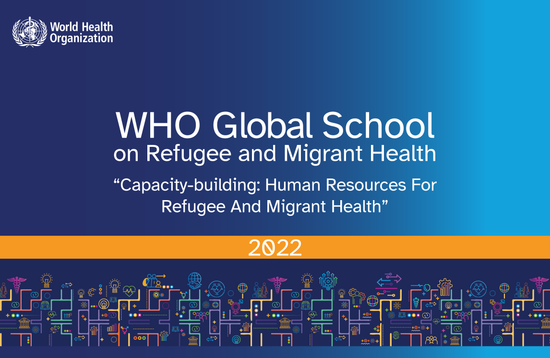
The WHO Department of Health and Migration aims to promote knowledge sharing, build on existing capacities and stimulate a research agenda on health and migration. The Department of Health and Migration organizes the yearly Global School on Refugee and Migrant Health with the aim of supporting countries and territories to build competency on the public health aspects of migration and to promote the development and dissemination of knowledge, attitude and practices based on the exchange of experiences and evidence.
This course consists of video recordings from the 2022 School, which focuses on promoting capacity-building for improving refugee and migrant health.
Language: English
Health topic
Course information
Overview
The primary aim of the yearly Global School on Refugee and Migrant Health is to contribute to promoting health among migrants, refugees, and their host populations. Each year, the Global School programme is developed around an overarching thematic area, built by merging and exchanging country knowledge and experiences in close collaboration with WHO regional offices, WHO country offices and governments.
This course was developed from previous recording sessions held during 2022. Technical content is delivered innovatively through video reportages, presentations and panel discussions with engagement of international experts, representatives from WHO and other United Nations agencies, and field actors from different regions and disciplines relevant to the area of health and migration.
Please access the Health and Migration Programme (who.int) page for further information and resources.
Course duration
10 hours
Certificates
A Certificate of Achievement will be available to participants who score at least 80% in the final assessment.
Participants who receive a Certificate of Achievement can also download an Open Badge for this course. Click here to learn how.
What you'll learn
- Promote evidence-informed and best-practice interventions to address refugee and migrant health needs and rights
- Strengthen understanding and knowhow to manage health systems and public health aspects of refugee and migrant health
- Bridge research, policy, and practice by fostering debate and critical thinking
Who this course is for
- This e-learning course is open to everyone, with the main target audience being policymakers, health sector managers and officers working at different levels within ministries, researchers, academia, and representatives of nongovernmental organizations.
Course contents
Course introduction
Module 1: Capacity-building for health systems response to refugee and migrant health needs and rights:
This module will frame the concept of capacity-building within the context of refugee and migrant health and will provide a global overview on existing efforts towards this.Module 2: Building capacity for addressing the gender dimension of refugee and migrant health:
This module will provide a global overview about the specific competencies needed to address the existing gaps related to gender dynamic of migration with a focus on the specific health risks among refugee women and girls.Module 3: Building capacity for culturally pertinent health care:
This module will frame essential competencies and unique experiences related to capacity-building for culturally pertinent health care for refugees and migrants at point of care or service delivery.Module 4: The pivotal role of universities in building competence for refugee and migrant health:
This module will provide a global overview of the role that academic institutions can play in improving workforce competence in refugee and migrant health and in promoting a coordinated and collaborative global research agenda.Module 5: Capacity-building for refugee and migrant health through global and regional cooperation and synergy:
This module will expose the concept and practice of building synergies among countries to strengthen refugee and migrant health capacities and competences, and the role of the international agencies in promoting this process.Final assessment:
There are 5 questions in this quiz-based assessment. The questions are a recap of the content covered in Modules 1 to 5. You must score 80% to pass.Course close
Enroll me for this course
Certificate Requirements
- Gain a Record of Achievement by earning at least 80% of the maximum number of points from all graded assignments.
- Gain an Open Badge by completing the course.